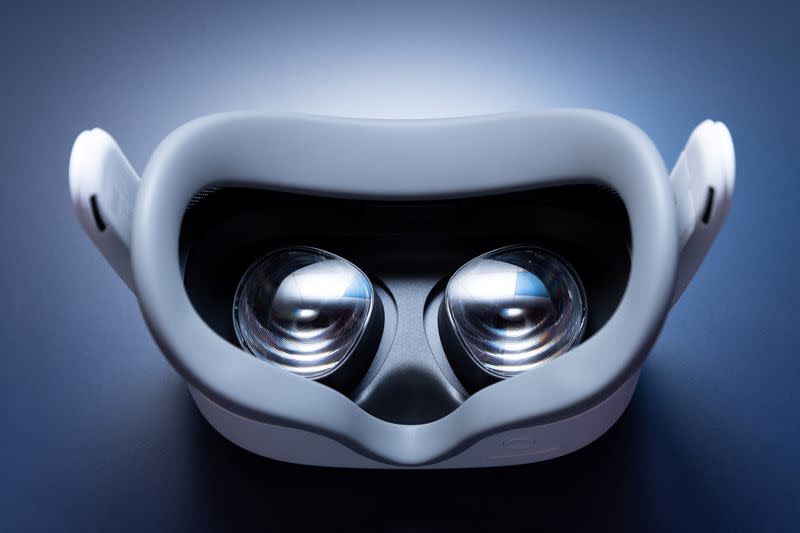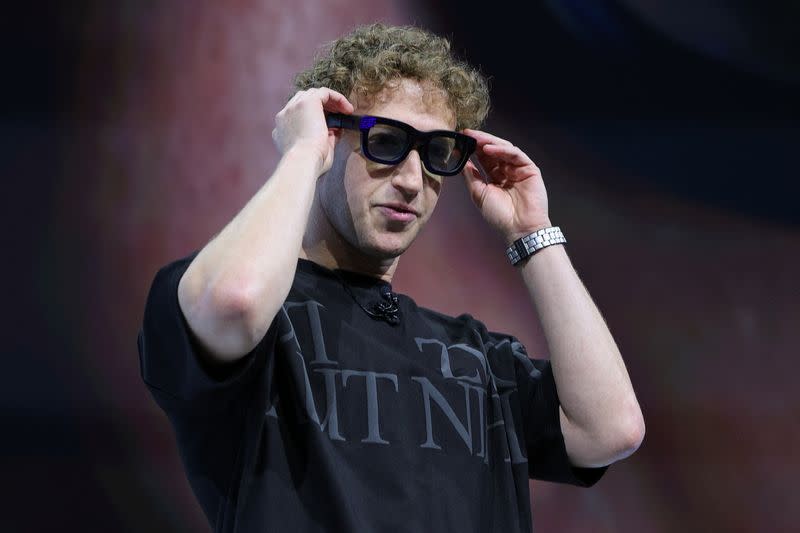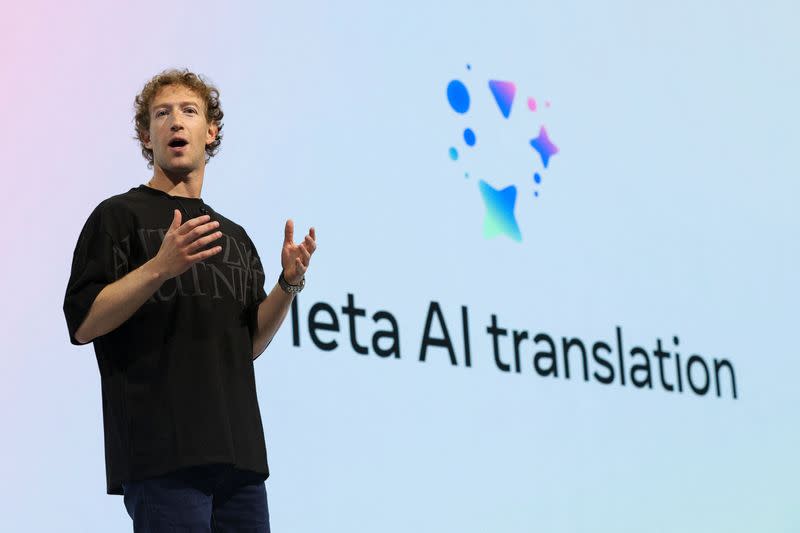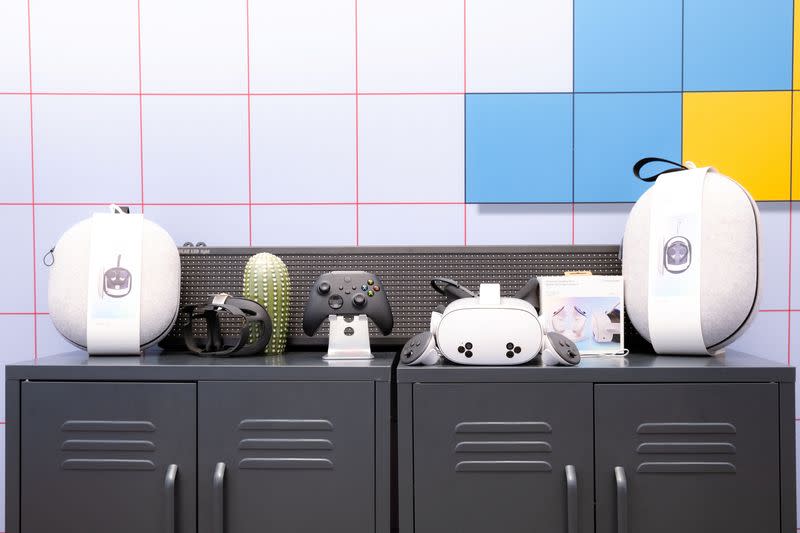Meta unveils augmented-reality glasses with Orion prototype
By Katie Paul
MENLO PARK, California (Reuters) -Facebook owner Meta Platforms showed off its first working prototype of augmented-reality glasses, called Orion, during its annual Connect conference on Wednesday, as the California company sketched out its aspirations for products that would bring the virtual world into the real one.
"This is the physical world with holograms overlaid on," Chief Executive Mark Zuckerberg said after pulling out the chunky black glasses from a metal case dramatically brought to him on stage. Shares rose 2.2% to a new high.
The Orion glasses are made of magnesium alloy and powered by custom silicon designed by Meta. Users will be able to interact with the glasses through hand-tracking, voice and wrist-based neural interface. Zuckerberg called Orion a “dev kit” and said Meta planned to work on making it smaller, sleeker and more low-cost for consumers later on.
Big Tech has for years been developing AR devices, although the most notable ones have been failures, such as Google's notorious Glass glasses.
The augmented-reality reveal is a long time in the making for Zuckerberg, who positioned AR technology as a sort of magnum opus when he first pivoted the world’s biggest social media company toward building immersive “metaverse” systems in 2021. Delivering products has been hampered by high development costs and technological hurdles.
Paolo Pescatore, an analyst at PP Foresight, said there was no doubt of Meta's aspiration to make virtual- and augmented-reality products as mass-market and affordable as possible. But he added that users were "still wary of AI" and needed some convincing.
Meta aims to ship its first commercial AR glasses to consumers in 2027, by which point technical breakthroughs should bring down the cost of production, a source said before the event.
The AR glasses can show multiple little windows with WhatsApp and Messenger texts, video-calls and Instagram reels, Zuckerberg showed, although the presentation offered few details of the device's abilities. Videos showed testers reacting positively, including the CEO of Nvidia, Jensen Huang.
Meta also announced a slew of software enhancements to the AI assistant that has driven interest in the Ray-Ban Meta smart glasses, making it possible for users, for example, to scan QR codes and stream music from Spotify in response to voice prompts.
Later this year, the company plans to add video capabilities and the ability to perform real-time language translation between English and French, Italian or Spanish.
The Facebook owner kicked off the Connect event with expanded bets on artificial intelligence, announcing a raft of new product offerings for its ChatGPT-like chatbot and plans to start automatically injecting personalized images created by the bot into people's Facebook and Instagram feeds.
Meta also announced an entry-level version of its Quest line of mixed-reality headsets, the Quest 3S.
Among the AI updates announced was an audio upgrade to the digital assistant, called Meta AI, which will now respond to voice commands and offer users the option to make the assistant sound like celebrities including Judi Dench and John Cena.
“I think that voice is going to be a way more natural way of interacting with AI than text," Zuckerberg said.
The company said more than 400 million people are using Meta AI monthly, including 185 million who are returning to it weekly.
In keeping with its strategy of sharing the AI models powering its digital agent for free use by others, Meta released three new versions of its Llama 3 models. Two of the models are multimodal, meaning they can understand both images and text, while the third is a basic text-only model capable of running entirely on a user's device, a key privacy advantage.
Meta has struggled to overcome technical challenges with its AR project in recent years, prompting the head of the company’s metaverse-oriented Reality Labs division to acknowledge last year that a product it could viably bring to market was “still a few years away - a few, to put it lightly."
The company has been plowing tens of billions of dollars into its investments in artificial intelligence, augmented reality and other metaverse technologies, driving up its capital expense forecast for 2024 to a record high of between $37 billion and $40 billion.
Its metaverse unit Reality Labs lost $8.3 billion in the first half of this year, according to the most recent disclosures. It lost $16 billion last year.
Riding a wave of excitement around emerging generative AI technology, the company announced at last year’s Connect conference that it was adding an AI-powered digital assistant to the Ray-Ban glasses, turning a once-forgotten device into the most popular AI wearable on the market.
Although Meta has not disclosed sales numbers for the smart glasses, the CEO of Ray-Ban maker EssilorLuxottica said this summer that more of the new generation sold in a few months than the old ones did in two years. Market research firm IDC estimates that more than 700,000 pairs of the glasses have shipped since the update last year.
Set to hit shelves on Oct. 15, the Quest 3S headset will be offered in two storage capacity sizes, the smaller one priced at $299.99 and the other at $399.99.
With the launch, the company is discontinuing its older Quest 2 and high-end Quest Pro devices, while also dropping the price of the more powerful Quest 3 it introduced last year from $649.99 to $499.99.
(Reporting by Katie Paul in Menlo Park, CaliforniaAdditional reporting by Yuvraj Malik, Aditya Soni, Shanima A and Jaspreet Singh in BengaluruWriting by Peter HendersonEditing by Shri Navaratnam, Kenneth Li and Matthew Lewis)









